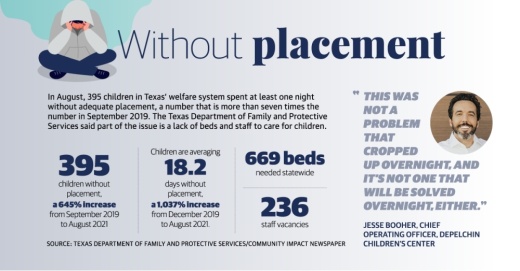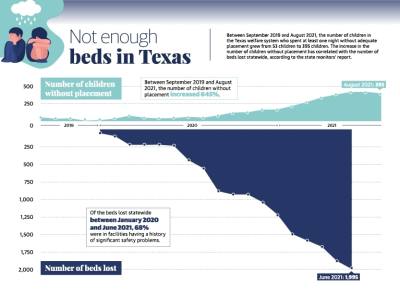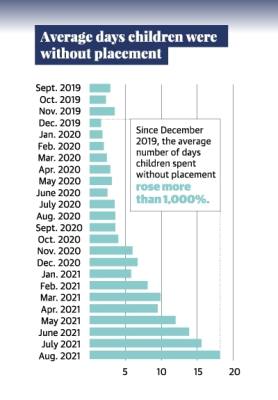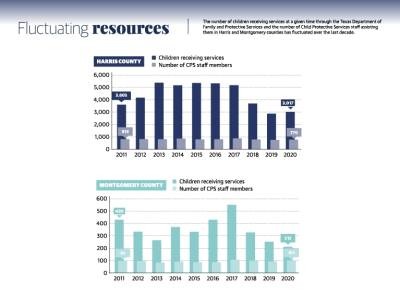Further, the number of children who spent at least one night without proper placement in August 2021 was more than seven times the number of children in September 2019, DFPS data shows.
Child Protective Services is responsible for selecting an adequate placement for a child when the DFPS takes temporary or permanent custody of a child. If a placement is not found, such as with kin or a foster family, the DFPS becomes the direct provider of services.
These children are often placed in hotels or DFPS offices, rather than foster homes or residential treatment centers. In September, a report by court-appointed monitors inspecting Texas’ foster system found placing children in these settings poses substantial risks to their safety as these placements lack regulations and resources available in adequate placements.
“[Being without a placement] is not ideal for any child ... because those needs that must be met; I don’t see how they are being met,” said Patricia Johnson, who worked for 27 years for the DFPS and is the kinship director for Angel Reach, a nonprofit serving youth who have aged out of the foster system in Montgomery County.
Multiple factors have contributed to the rise in children without placement, or CWOP, including hundreds of beds lost due to facility closures, DFPS’ report said.
Locally, Harris and Montgomery county organizations have stepped up to try to alleviate the issue.
“We make the [CWOP population] our priority,” said Tammy Hetmaniak, executive director of Be a Resource for CPS Kids, which is based in Harris County. “It’s important that we can make them as stable as we possibly can.”
Increased scrutiny
In November 2018, the 5th Circuit Court of Appeals established “heightened monitoring” of Texas’ child welfare operations. The practice was born out of ongoing litigation since March 2011 alleging the state had multiple constitutional violations in how it runs its child welfare system.
As part of heightened monitoring, child welfare facilities that contract with the state and have a history of policy violations are subject to increased inspections and corrective actions, according to the 2018 ruling. Those that do not comply could not receive foster youth or face fines, revoked licenses or contract termination.
As a result of the court’s order, Texas has lost 2,129 general residential beds between January 2020 and September 2021, according to the court monitors’ report, 1,213 of which were lost due to forced closures.
The DFPS has identified a need for 669 additional beds throughout the state to meet growing demands, according to the DFPS September report. In addition, the department is lacking CPS caseworkers, with 236 vacancies across the state, the report found.
In Montgomery County, there were 67 CPS caseworkers in 2020, four more than the previous year. However, in Harris County, the number is declining with 76 fewer caseworkers in 2020 than in 2017, according to DFPS data.
Multiple pieces of state legislation passed in 2021 sought to address these shortages.
Senate Bill 1896 revised and added rules for the DFPS, including forbidding the department from housing a child in an office overnight.
In addition, the Legislature funded $83.1 million in SB 1 to hire 312 caseworkers, according to the DFPS’ September report. House Bill 5 allotted an additional $90 million to the DFPS, which will be used to retain providers and increase capacity to serve foster youth, according to the bill.
“The importance of this funding cannot be overstated,” said Melissa Lanford, the media specialist for DFPS Region 6, which includes the Greater Houston area. “It is the difference between a real placement for these older children and continuing to live in a CPS office or hotel.”
CWOP crisis
While heightened monitoring has led to the closure of many unsafe environments for children, it has significantly stressed the system, Hetmaniak said.
“Personally, I think they tried to fix one problem, and it just created another problem,” Hetmaniak said.
Johnson said additional beds need to be planned to anticipate closings from heightened monitoring.
“For every home that is closed, you almost need two more to open,” Johnson said.
Jesse Booher, chief operating officer of DePelchin Children’s Center—a nonprofit offering foster and adoption services in Harris County—said he believes the state can start alleviating the issue by adding beds, having a strong relationship with the courts and increasing funding.
“This was not a problem that cropped up overnight, and it’s not one that will be solved overnight, either,” he said.
However, Booher said the issue is not just needing more beds, but also needing placements for children with high-acuity needs. Sixty-six percent of CWOP require specialized or intense care, compared to 20% of all foster children, according to the court monitors’ report.
The court monitors’ report found as the number of CWOP increased, serious incidents involving these children, such as mental health episodes, physical aggression toward staff and self-harm, also increased. In January, there were seven serious incidents involving CWOP; in June there were 69 incidents. “I look at it as these are all our children,” Johnson said. “If one fails, we all fail.”
Local efforts
Many child welfare organizations in Harris and Montgomery counties have tried to address the rise in CWOP, nonprofit leaders said. In July, DFPS Region 6 ended its licensing of 250 foster homes in the Houston area, Lanford said. Instead of Region 6 operating the homes, the homes will now be operated by locally-based organizations to involve the community more.
DePelchin Children’s Center took on 50 of these foster families, Booher said.
“Had organizations like DePelchin—and we’re by no means the only one—not stepped in in that particular situation, those children would have ended up in the children-without-placement status,” Booher said.
Further, Court Appointed Special Advocates of Montgomery County moved into a new Conroe property in November, Executive Director Ann Marie Ronsman said. The new space will provides classes and connections for CWOP, something the organization could not do before, although it can not house them, Ronsman said.
“There is a lot of stress on the foster care system right now, and many times our volunteer is the only constant in the child’s life,” she said.
Additionally, Montgomery County partners, such as CASA, Judge Mark Keough and the district attorney’s office, held the inaugural meeting Sept. 10 of its Trauma Informed Task Force, of which Ronsman is a co-chair. Ronsman said the group will focus on educating the community about childhood trauma.
“The more that we can all understand how to work with kids, the better those kids will do,” Ronsman said. “Sometimes that isn’t intuitive with children with trauma, so that’s what we’re trying to do with community education.”
Wesley Gardner contributed to this report.








